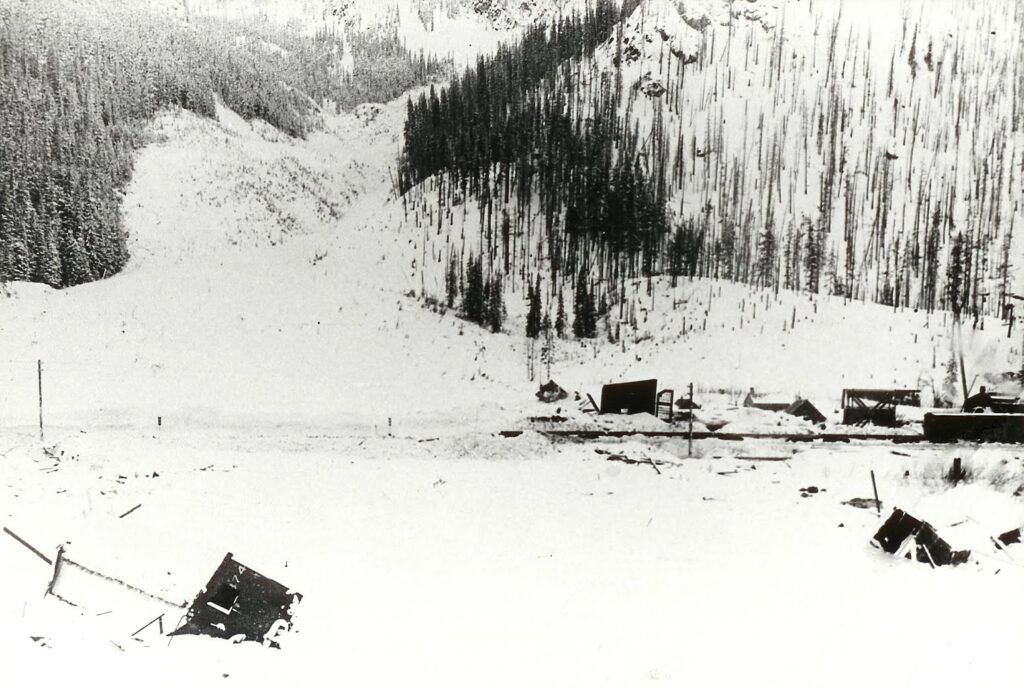Rogers Pass Snow Slide 1899

We have managed over the last 100 years to learn how to cause humankind to live longer. We have antibiotics to combat infection and pneumonia, two of the most common killers of yesteryear. Seldom do people die any longer from scarlet fever or the chickenpox. But the killers that we haven’t figured out yet how to control are those caused by Mother Nature.
Such as that horrible avalanche in the east. One hundred years ago on January 31, 1899, an avalanche in Rogers Pass wiped out a whole family.
It was the most tragic series of events to ever be recorded in that particular section of the Rogers Pass. Early in the morning of January 31, 1899, snowshed Number 19 was swept by a snowslide into the canyon of the llecillewaet River. The track was torn up for some distance and the man in charge of the shed was killed. His body swept away by the snow.
Later in the day at Rogers Pass Station, the tragedy was to continue. Few railroad men have been better known or more highly respected than Billy Cator, station agent and operator
at Rogers Pass. Cator had been stationed at the Pass for a good number of years and was a married man with two children. The children were favorites of all the men who worked in the area.
For the convenience of the railway workers, Mr. and Mrs. Cator operated a boarding house. It seemed that many men took advantage of the chance to have home-cooked meals and a warm bed because the Cator family had to hire help. They had, in their employ, a Chinese cook and a young woman named Annie Berger, sister to Mrs. Fred Anderson.
The weather had been stormy and windy but no one considered there was any danger. Never in the 14-year history of the Pass had a slide ever come down in that area, that was the reason that the station was built where it was. Yet at about 3:30 the afternoon, a slide, which must have started far up on the mountain, came rushing down.
Mr. Cator, who was talking to a man in the station agents office, was alerted to the slide and went running out to grab his two little children who were playing in front of the station. He and the children were swept away by the slide and killed.
The slide was so fast and powerful that it first rushed over the round house containing an engine, which was demolished, and then struck the station, smashing it up and sweeping it along with the rest of the destruction.
Mr. Cator, his wife and two children and the-Chinese servant were all killed, as was Corsan, the night operator, who was asleep in the station building at the time. Rigley, the man who was in charge of the coal; was also killed.
Miss Berger, who was her bedroom at the time of the tragedy, said that all she remembered was that the atmosphere became dark and then she found herself lying in the surface of the snow with the roof of the station lying across her, legs. One of her legs was broken, the other badly bruised. As soon as was possible, a special engine was sent out from Golden with Dr., Taylor aboard to care for the injured. As well as Miss Berger, there were two Chinese workers in a boarding car who were also injured. The escape with minor injuries of the two Chinese workers was nothing short of a miracle as the boarding car they were in at the time was next to the station and was actually hit by the slide before
the station was.
Mr. Marpole and Mr. Duchesnay, were the superintendents of the day, were at Donald taking over the division at the time of the tragedy. They hurried at once to the scene of the disaster and did all that they could to help retrieve the bodies of those killed.
Railway and telegraphic communication were blocked and as a result the eastern passenger trains could only get as far as Donald until late the following day. By Thursday, the telegraph lines had been restored and the through railway service resumed.
The body of Mrs. Cator and the two small children were taken to Bowmanville, Ontario, where they were soon joined by those of Mr. Cator. It was said to be one of the saddest funerals in that town’s history as the funeral procession moved down the street bearing the remains of an entire family.
